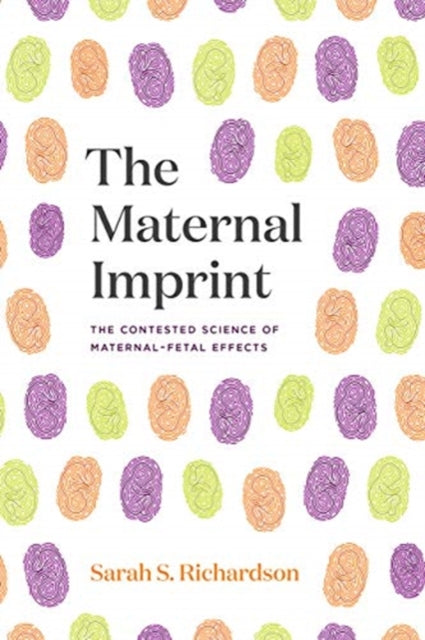Sarah S. Richardson
Maternal Imprint: The Contested Science of Maternal-Fetal Effects
Maternal Imprint: The Contested Science of Maternal-Fetal Effects
YOU SAVE £1.10
- Condition: Brand new
- UK Delivery times: Usually arrives within 2 - 3 working days
- UK Shipping: Fee starts at £2.39. Subject to product weight & dimension
Bulk ordering. Want 15 or more copies? Get a personalised quote and bigger discounts. Learn more about bulk orders.
Couldn't load pickup availability
- More about Maternal Imprint: The Contested Science of Maternal-Fetal Effects
Sarah S. Richardson's book explores the idea that a woman's health and behavior during pregnancy can have long-term effects on her descendants' health and welfare, challenging the consensus that a child's fate is set by genes and post-birth upbringing.
Format: Paperback / softback
Length: 384 pages
Publication date: 05 November 2021
Publisher: The University of Chicago Press
The notion that a woman's health and behavior during pregnancy can have long-term effects on her descendants' health and welfare has a fascinating and complex history. While this idea has been prevalent in folk intuition and scientific inquiry for centuries, the understanding of its implications has evolved significantly over time. In the early 20th century, when modern genetics emerged, there was a prevailing consensus among biomedical scientists that a mother's influence on her offspring's traits was limited, except in cases of extreme deprivation or injury. The belief was that a child's fate was predetermined by a combination of its genes and post-birth upbringing.
However, over the past fifty years, this consensus has been dismantled, and a new wave of research on the intrauterine environment and its effects on the fetus is emerging as a robust field of study in medicine, public health, psychology, evolutionary biology, and genomics. These sciences collectively argue that a woman's experiences, behaviors, and physiology can have profound life-altering effects on offspring development.
To trace the genealogy of ideas about heredity and maternal-fetal effects, this book offers a critical analysis of conceptual and ethical issues. It explores the staggering implications for maternal well-being and reproductive autonomy that arise from the striking rise of epigenetics and fetal origins science in postgenomic biology today.
The study of epigenetics has revealed that the biological processes that regulate gene expression can be influenced by environmental factors, such as diet, stress, and toxins. These epigenetic changes can have lasting effects on the development of the fetus and can even pass down to future generations. For example, research has shown that maternal smoking during pregnancy can increase the risk of respiratory problems, cardiovascular disease, and cancer in the offspring.
Similarly, the field of fetal origins science focuses on understanding the origins of health and disease in the developing fetus. This research has revealed that the intrauterine environment, including factors such as maternal nutrition, stress, and infections, can have a significant impact on the development of the fetus's organs, tissues, and systems. For example, inadequate maternal nutrition during pregnancy can lead to birth defects, while exposure to certain toxins or infections can increase the risk of developmental disorders.
The implications of these findings for maternal health and reproductive autonomy are profound. Women now have a greater understanding of the factors that can impact their offspring's health and development, and this knowledge can empower them to make informed decisions about their own health and well-being during pregnancy. It can also lead to new interventions and treatments that can improve the health and well-being of pregnant women and their offspring.
However, the rise of epigenetics and fetal origins science also raises important ethical questions. For example, how do we balance the need for scientific progress with the need for protecting women's privacy and autonomy? How do we ensure that the benefits of these studies are distributed fairly and that they do not exacerbate existing inequalities?
In conclusion, the idea that a woman's health and behavior during pregnancy can have long-term effects on her descendants' health and welfare has a rich and complex history. While the understanding of these implications has evolved significantly over time, the recent rise of epigenetics and fetal origins science has brought new insights and challenges. By critically analyzing these issues, we can better understand the potential impacts of the intrauterine environment on fetal development and work towards developing interventions and treatments that promote maternal health and reproductive autonomy.
Weight: 472g
Dimension: 152 x 230 x 19 (mm)
ISBN-13: 9780226544809
This item can be found in:
UK and International shipping information
UK and International shipping information
UK Delivery and returns information:
- Delivery within 2 - 3 days when ordering in the UK.
- Shipping fee for UK customers from £2.39. Fully tracked shipping service available.
- Returns policy: Return within 30 days of receipt for full refund.
International deliveries:
Shulph Ink now ships to Australia, Belgium, Canada, France, Germany, Ireland, Italy, India, Luxembourg Saudi Arabia, Singapore, Spain, Netherlands, New Zealand, United Arab Emirates, United States of America.
- Delivery times: within 5 - 10 days for international orders.
- Shipping fee: charges vary for overseas orders. Only tracked services are available for most international orders. Some countries have untracked shipping options.
- Customs charges: If ordering to addresses outside the United Kingdom, you may or may not incur additional customs and duties fees during local delivery.


